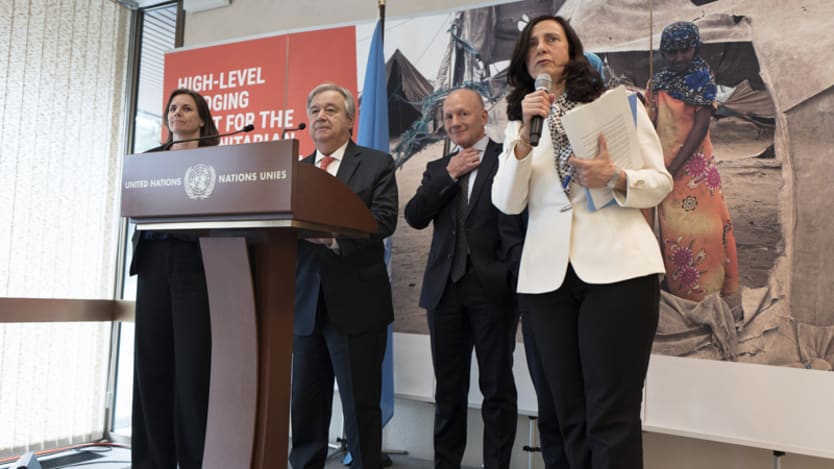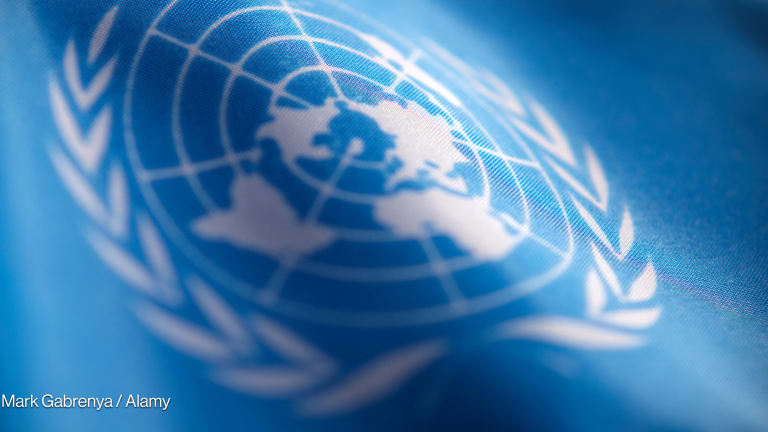
NEW YORK / BRUSSELS — The United Nations secured around $2 billion for humanitarian aid to Yemen this year at a pledging conference in Geneva on Tuesday, amid warnings that lack of adequate access to 22 million people in need remains a dangerous reality.
The funding pledged at the high-level event fell short of the U.N.’s $2.96 billion goal. Saudi Arabia and the United Arab Emirates each pledged $500 million, making up nearly half of the $2.01 billion total promised by 40 states. More could be on the way, if an additional $500 million that Saudi Arabia and the UAE have vowed to secure from neighboring countries materializes.
Other top donors included Kuwait ($250 million), the United Kingdom ($239.7 million), the European Union ($132.7 million), and the United States ($87 million).
But participants acknowledged that more money for Yemen — recently called “the world’s worst humanitarian crisis” by U.N. Secretary General António Guterres — will only go so far without a political solution to the war.
See more related topics:
► Q&A: How women are surviving as Yemen enters its fourth year of war
► 3 million Yemeni children born in war face uncertain future, UNICEF says
► No clear path ahead for Yemen aid as 30-day lift of blockade expires
► UN evacuates staff as Yemen crisis worsens, threatens women, girls
► Exclusive: MSF cuts cholera operation from Yemen as cases diminish
Discussions in Geneva focused on how to facilitate humanitarian efforts, with agencies reporting access issues in 90 percent of Yemen’s districts, Guterres said.
Nathalie Chuard from the Swiss Agency for Development and Cooperation conceded at the event that some humanitarian groups “are a bit disconnected with the reality because we don’t have as much access as we want. Our SDC office has been closed there since 2014 for security reasons.”
The humanitarian crisis persisted last year, as the number of people reached by the World Food Programme each month went from 3 million to 7 million, according to Elisabeth Rasmusson, the WFP’s assistant executive director for partnership, governance, and advocacy.
Last year, the U.N. brought in more than 70 percent of the $2.34 billion it sought for Yemen aid.
Saudi Arabia and the UAE first announced their 2018 pledges in late March. Some other commitments, like $50 million from the U.N.’s Central Emergency Response Fund, were also announced previously.
The UAE and Saudi Arabia play an active role in Yemen’s civil war, which entered a fourth year in March. Saudi Arabia and the UAE back a campaign to restore Yemen’s exiled president, Abdrabbuh Mansour Hadi, while the Houthi separatist movement has gained the support of Iran.
Guterres called Tuesday’s conference a “remarkable success,” and said he was optimistic about meeting the funding target with more pledges expected before the end of the year.
James Munn, president of the Norwegian Refugee Council, told Devex that the $2.96 billion U.N. assessment for humanitarian needs is likely an underestimate, especially as the currency rate in Yemen continues to fall.
More than 22 million people, three-quarters of Yemen’s population, need humanitarian aid, according to U.N. estimates. Half of the Yemen’s health facilities are shut down or not working properly, and 2,500 schools have been destroyed during the conflict, placing 2 million children out of school.
Jan Egeland, secretary general of the NRC, said humanitarian access is ultimately dependent on a ceasefire, peace talks, and a political settlement.
He said the situation was “much better than during the blockade days of November-December” but that there was still not enough fuel coming in to maintain public services, including water.
“I’m always afraid that an attack like the one on Hodeida in the last 48 hours, which certainly is linked to the missiles going into Saudi … could lead to new access problems to Yemen,” Egeland said.
Saudi Arabia's ambassador to Yemen, Mohammed Al-Jaber, told the conference that “Iran-backed Houthi militia” launched rockets towards Saudi cities on Sunday, including the capital Riyadh.
“What if these rockets targeted Stockholm, London, Washington, Geneva, along with scores of shells on your border towns?” Al-Jaber said.
On Monday, Saudi warplanes killed 14 civilians in Hodeida who had gone outside to escape the heat.
After visiting the western coastal city, Jolien Veldwijk, CARE International’s assistant country director for program quality in Yemen, told Devex that those killed and most of the wounded in the strike were women and children.
Veldwijk said humanitarians try to “deconflict” areas where aid is being distributed by putting large signs on the ground, and sending the coordinates to the Saudi coalition via the United Nations.
“If you get an acknowledgement that the coordinates have been registered, that’s already really good,” Veldwijk said. “But sometimes you don’t.”
Asked at a press conference about Saudi Arabia pledging assistance to the same country it is bombing, Guterres said: “Well, we all know that there is a war, we all know who are the parties to the war, but the two things need to be seen separately: Independently of the fact that there is a war, there are humanitarian obligations that are assumed by countries, and today we were exactly registering a very strong support of the international community to the people of Yemen.”
Munn from the NRC said the “softer political approaches” by Saudi Arabia and the UAE were evidence that “they're very much aware of how they're perceived and how they are seen, not just by governments, but by the world's population.”
He added that NRC’s impartiality in Yemen — where it aided more than 762,000 people last year — means that it won’t accept the new funding from Saudi Arabia and the UAE. The money will go to U.N. agencies and some other implementing partners instead.
“It just doesn't work for a humanitarian agency that is founded on approaching people through access and through negotiations to also receive support from one party or the other,” he said.
Search for articles
Most Read
- 1
- 2
- 3
- 4
- 5









